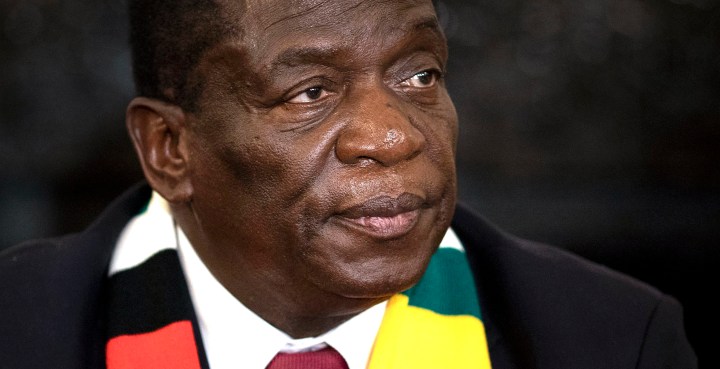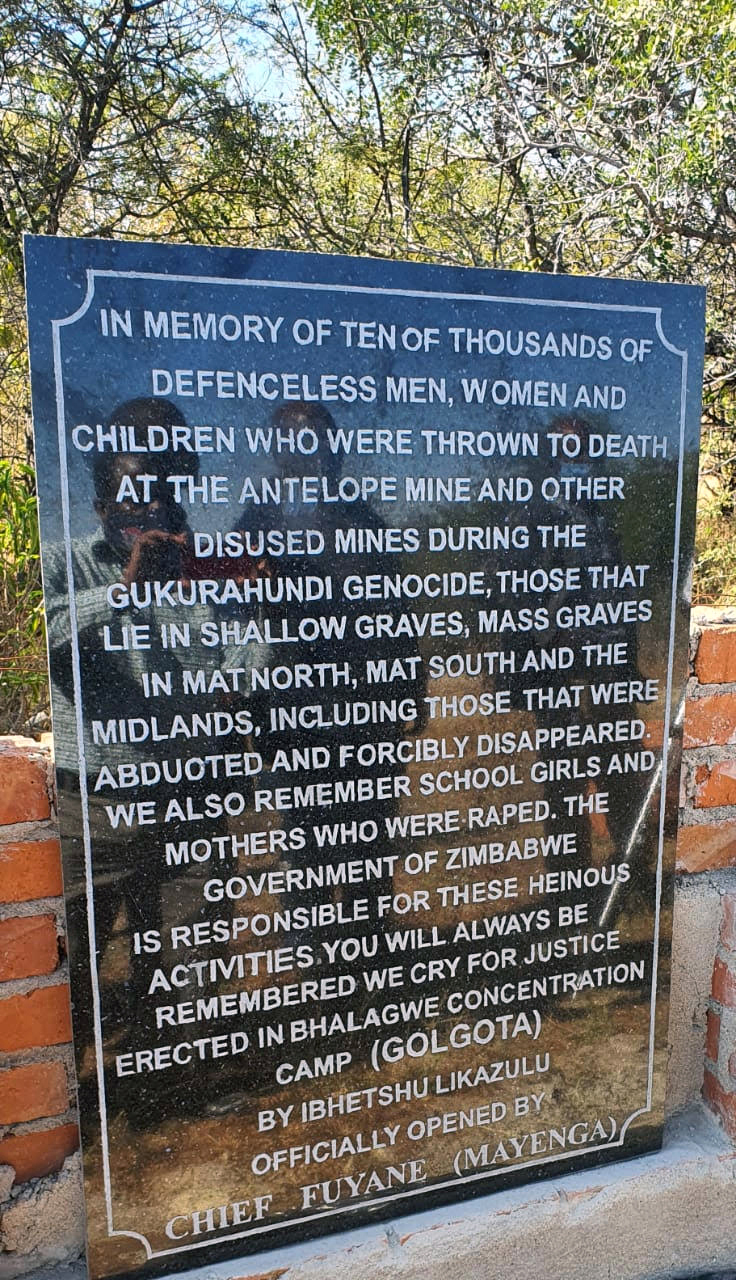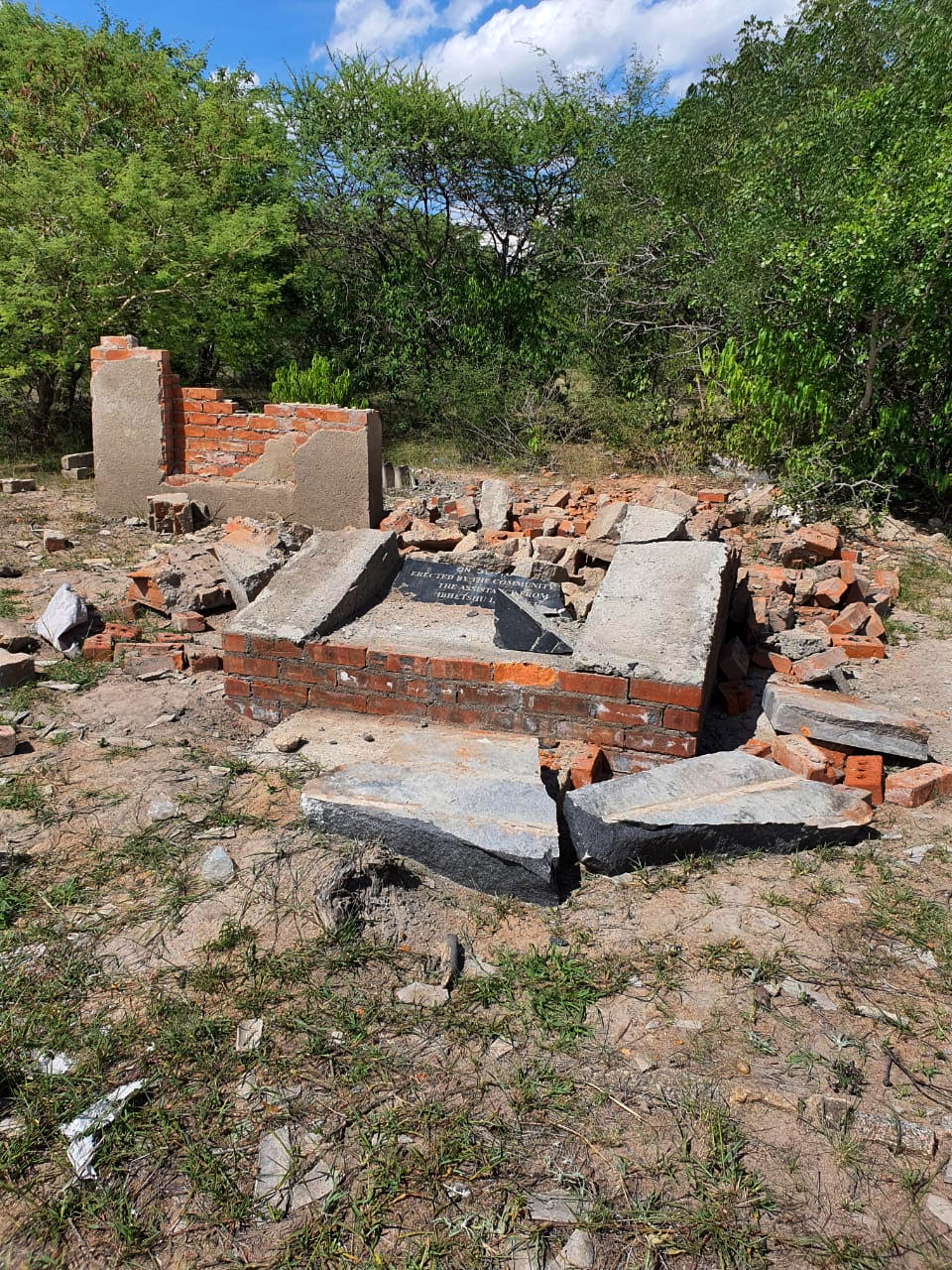ZIMBABWE IN RUINS OP-ED
Destruction of Gukurahundi memorials prolongs torture of victims and their descendants

President Emmerson Mnangagwa’s utterances about wanting to ‘deal with the Gukurahundi genocide’ are not sincere, as evidenced by the fact that his government has not dealt with any of the problems experienced by its victims and their descendants – and this revictimisation is unconscionable.
On 30 October 2021, Ibhetshu LikaZulu, an organisation that provides memorials to victims of Gukurahundi, erected a memorial plaque in the remote rural valley of Bhalagwe in Matabeleland, southwestern Zimbabwe. It was the third time they had replaced the plaque after the others had been torn down by the government. This was a bigger and more secure plaque, and impossible to tear down. Or so they thought.
On the night of 4 January 2022, two months after the plaque had been erected, villagers in Bhalagwe heard a blast at about 9pm. They locked themselves in their huts in fear as they had no idea what was happening. The next day they woke up to the news that the memorial plaque at Bhalagwe had been blasted to pieces with explosives.
I interviewed a villager who said they were angry that the same government that had killed their parents and denied them dignified burials was again torturing them by denying them the chance to memorialise them. He said it was sad that the president was a liar. They had believed that the new dispensation was willing and ready to allow them to mourn their dead and even rebury them. It was clear to the villagers that the government and Zanu-PF were unrepentant, he said.
He vowed that they would erect another plaque and nothing the government did would stop them from demanding justice.
Another villager said they saw the bombing of the plaque as a threat that the government would come for them too. She said she and her family expected to be attacked at night by soldiers at any time, because this was how Gukurahundi had started. She said she was ready for anything.
I asked her if that meant she was not afraid. She replied that they were afraid, but would not stop trying to memorialise those who died during the genocide. She was more afraid of the spirits of dead relatives who were not resting in peace. She explained that many families attributed the poverty, drought and emotional suffering they were experiencing to the belief that too many people in the area were not resting in peace. The memorial plaques were their way of trying to enable them to rest peacefully.
Bhalagwe is the site of the largest Gukurahundi genocide concentration camp. It was where thousands of men and women were held against their will after being abducted from their homes. Many died from torture, execution and starvation. At first they would be buried in mass graves inside the camp, but in no time they were all filled. This led to the dumping of bodies into disused shafts at the nearby Antelope mine.

On 30 October 2021, Ibhetshu LikaZulu replaced a Gukurahundi memorial plaque in Bhalagwe, Matabeleland. The government tore down the previous two. (Photo: Thandekile Moyo)
During the Mugabe era, when the government realised that civil society organisations and NGOs were gathering evidence of the genocide at Bhalagwe, they razed buildings and compacted the earth with graders and earth-moving equipment. This effort to conceal evidence did not stop there. It is reported that the government regularly tosses explosives into the disused mine shafts into which they dumped bodies during the genocide.
All these actions by the perpetrators have, however, done nothing to silence the demands for justice from victims of the genocide and their families.
President Mnangagwa: unfulfilled promises
When President Emmerson Mnangagwa got into power through the 2017 coup, he found himself faced with the dilemma of having to engage the Gukurahundi genocide issue, or at the very least, seem to be engaging it.
On 21 March 2019, he met a group of civil society organisations from Bulawayo called the Matabeleland Collective, apparently to discuss Matabeleland issues including Gukurahundi. Virginia Mabhiza, the permanent secretary in the ministry of justice, held a press conference on 9 April 2021, announcing the key outcomes of the meeting. She said:
- “The Ministry of Home Affairs will be engaging people to facilitate the issuing of birth and death certificates for all Gukurahundi victims;
- Exhumation of those who died during Gukurahundi must be carried out legally and in an orderly manner. The Ministry of Home Affairs will engage the affected people and start on the process;
- The Ministry of Health and Child Welfare has been mandated to provide medication for Gukurahundi victims; and
- The office of the president has allowed for open discussions on Gukurahundi. It is a starting point that will clear the path for people’s questions to be answered.”
Three years later none of these promises by the president and his government has been fulfilled.
After the announcements many people from Matabeleland asked what this Matabeleland Collective was, and who had given them the mandate to “discuss” the Gukurahundi genocide with the perpetrators on behalf of the region in the first place. They were accused of being Mnangagwa allies in his bid to hoodwink Matabeleland into thinking something was finally being done about the genocide.
When the Matabeleland Collective scheme failed, Mnangagwa tried other ways of pretending to be engaging with the Gukurahundi genocide. In August 2021, he met chiefs from Matabeleland. In the meeting he mandated the chiefs to “deal with Gukurahundi”. There was an outcry from victims of Gukurahundi, who said it was unheard of and disrespectful for the perpetrators to dictate the way forward. Some victims also felt that by meeting the president, the chiefs had allowed themselves to be disrespected. Others expressed concern that the chiefs were subordinate and subservient to the president and that many of them were compromised because they had recently been given cars by the government.
In the meeting, the government promised the chiefs it would facilitate the documentation of victims by issuing birth certificates, IDs and death certificates to them. Many missing victims were undocumented and therefore stateless because many had “disappeared”, which meant their families had been unable to obtain death certificates for them. To get a birth certificate in Zimbabwe an applicant must have their parents’ IDs, and death certificates if the parents are deceased.
Arson was one of the preferred methods of torture during Gukurahundi. The perpetrators set alight homes of victims with all their belongings inside. In many cases they locked people in a hut and set it on fire. After the genocide thousands of people from Matabeleland were left with no IDs, birth certificates, academic certificates and other important documents because they had been destroyed in these infernos.
Without an ID parents cannot obtain birth certificates for their children, creating generations of undocumented and stateless people. Without a birth certificate one cannot be enrolled in school in Zimbabwe. Some rural primary schools are lenient and allow children to learn, but they hit a snag in Grade 7 when they are required to register for exams with their birth certificate numbers. Due to this, thousands of children in Matabeleland are forced to drop out of school in their last year of primary education. This has adversely affected education in the region.

The desecrated monument to the victims of Gukurahundi in Bhalagwe, Zimbabwe. (Photo: Thandekile Moyo)
Lack of documentation also affects employment since Zimbabweans need an ID and academic certificates to apply for a job. This has led to serious levels of poverty in the region as parents cannot get employment and therefore cannot feed their children or send them to school. In the meeting with the chiefs, free education, social welfare and healthcare were among the services the government promised to provide for the people of Matabeleland.
None of these promises has been fulfilled.
This shows there is insincerity in the utterances by the president and the government about wanting to “deal with the Gukurahundi genocide”. Not only has the government not dealt with any of the issues discussed with the Matabeleland Collective and then with the chiefs, it has destroyed memorial plaques erected by victims in memory of their deceased and “disappeared relatives”. This revictimisation of victims of the genocide is unconscionable.
Mbuso Fuzwayo of Ibhetshu LikaZulu said: “The president openly said people are free to discuss Gukurahundi. But what they are doing by stopping commemorations and destroying plaques is a high level of disrespect.”
Ibhetshu LikaZulu and I reported the bombing of the plaque to the police at Maphisa police station. We submitted two statements and were given a case number. I have not heard from the police since we reported. When we told one of the villagers that we were going to report it to the police, they laughed and asked what we thought we would achieve by reporting a crime to the people who committed it. DM/MC
Thandekile Moyo is a writer and human rights defender from Zimbabwe. For the past four years she has been using print, digital and social media (Twitter: @mamoxn) to expose human rights abuses, bad governance and corruption. Moyo holds an Honours degree in Geography and Environmental Studies from Midlands State University in Zimbabwe.



















 Become an Insider
Become an Insider
Comments - Please login in order to comment.